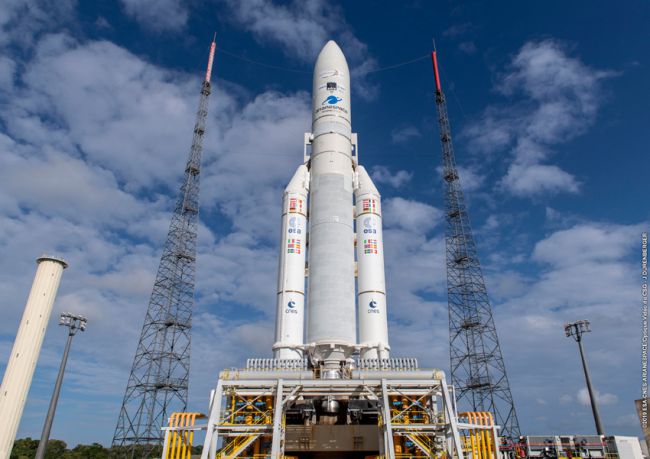
-
Published: 15 June 2023

The famous European rocket "Ariane 5" is being retired after 27 years in service, and its exit comes at a stage when the space sector in Europe is suffering a vacuum, as the continent has become almost deprived of reaching space with its own independent capabilities, waiting for the start of work with the Ariane 6 rocket, while competition is raging globally in this field.
Edited by| Paul Mitchel
Space section - CJ journalist
Guiana - June,15,2023
The "Ariane 5" rocket will be transporting a French military communications satellite (Syracuse 4B) and an experimental German satellite on its 117th and last space mission,which is expected tomorrow, Friday, between 21: 26 and 22: 01 (GMT) from the "Kourou" base in French Guiana, a French military communications satellite (Syracuse 4B) and an experimental German satellite.
The director of the Guiana Space Center, Marie-Anne Claire, says that the recent launch of the rocket is "accompanied by emotions"for the teams of the center, whose rocket has worked for three decades, during the transit to the huge European Space Base, her colleagues were moved in front of the building dedicated to Ariane 5, which was empty.
The "Ariane 5" rocket had a difficult start, exploding after taking off on its first mission in 1996, and faced another failure in 2002.
Erve gelibert, who was then a rocket engineer, says that the incident was "shocking to us", while the current technical director of the Ariane Group confirms that it "took two years to return to space missions".
After the incident, the Ariane 5 rocket entered its golden era, which was crowned with a series of successes, and Gilbert says that the failure to launch the rocket had the "positive effect of keeping us fully vigilant about launches".
The rocket gained such a good reputation for reliability that NASA adopted it to send the "James Webb" Space Telescope, the cost of which amounted to 10 billion dollars. After this launch, which was carried out on Christmas Day in 2021, the rocket, in which the "Rosetta" space probe was sent to Comet 67P / Churyumov-Gerasimenko in 2004, and the explorer of Jupiter's icy moons to Jupiter in April 2023, has a great prestige.
From a commercial point of view, the rocket was "a progressive element in the space field in Europe," emphasizes the director of space transportation of the European Space Agency Daniel Neuenschwander.
12 countries participated in the manufacture of the Heavy rocket that replaced the "Ariane 4" with twice the launch capacity, a competitive advantage that enabled Europe to establish itself in the market of communication satellites.
Neuenschwander said that Europe also benefited from a "respite" from the United States, as the American space shuttle monopolized many resources.
"We are currently witnessing the opposite situation," he said, as Europe finds itself almost deprived of independent access to space.
This is due to the sudden cessation of the use of Russian Soyuz missiles following the outbreak of the Ukraine war in February 2022, which reduced the activity of the "Kourou" base, which witnessed only six launches in 2022 compared to 15 similar operations last year.
The situation was aggravated by the failure of the first commercial launch of the Italian "Vega C" rocket in December 2022 and the cumulative delays of the future "Ariane 6". After Friday, there will be only one launch of"Vega", expected in September, and a possible return of the "Vega-C" program at the end of the year.
This means several months of emptiness waiting for the "Ariane 6" to take over at the end of 2023 at best.
The "Ariane 6", which is more powerful and competitive than the "Ariane 5" and cost half of what was spent on its predecessor "Ariane 5", was designed to face fierce competition in the rocket market due to the dominance of the American company "SpaceX", which carries out more than one launch per week.
The European Space Agency has had to turn to the company owned by Elon Musk to launch its scientific mission "Euclid", and is unsure about ensuring the strategic expansion of the Galileo probe, the navigation system of the European Union.
"It's not an easy stage, but it won't last," Arianespace President Stefan Israel said during a meeting of the Ariane 6 team, which is under pressure to complete the take-off process as soon as possible.
By that time, the teams at "Kourou" are dealing with their problems patiently, says the director of the "Guiana" Space Center, who expects a staff reduction of about 190 people out of 1,600.
The rest period will be used to implement a plan to renovate the base and increase its green spaces. Qualification tests of "Ariane 6" are in full swing, in two weeks the Vulcan engine will be running on the launch pad, an important stage is eagerly awaited.
{source}<script async src="https://pagead2.googlesyndication.com/pagead/js/adsbygoogle.js?client=ca-pub-4474625449481215"
crossorigin="anonymous"></script>
<!-- moss test ad -->
<ins class="adsbygoogle"
style="display:block"
data-ad-client="ca-pub-4474625449481215"
data-ad-slot="6499882985"
data-ad-format="auto"
data-full-width-responsive="true"></ins>
<script>
(adsbygoogle = window.adsbygoogle || []).push({});
</script>{/source}
